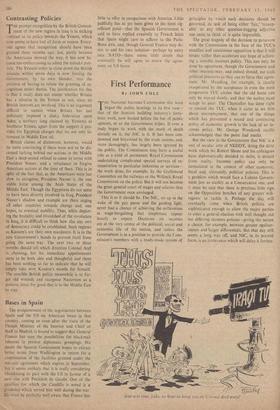First Performance
By JOHN COLE
PT' HE National Incomes Commission this week I began the public hearings in its first case— that of the Scottish building industry's forty- hour week, now hauled before the bar of public opinion, or so the Government hopes. If ever a body began its work with the mark of death already on it, the NIC is it. It has been con- demned and boycotted by the trade unions, and, more damagingly, has largely been ignored by the public. The Commission may have a useful role as a kind of permanent Royal Commission undertaking complicated special surveys of re- muneration in particular industries or services— the work done, for example, by the Guillebaud Committee on the railways or the Willinck Royal Commission on the police. But it will not become the great general court of wages and salaries that the Government once envisaged.
This is as it should be. The NIC, set up in the wake of the pay pause and the guiding light, never had a chance of achieving the millennium in wage-bargaining that simpletons appear hourly to expect. Decisions on incomes are at the very centre of the political, social and economic life of the nation, and unless the Government is in a position to provide the Com- mission's members with a ready-made system of principles by which such decisions should be governed, its task of being either `fair,' reason- able' or any other question-begging adjective one cares to think of is quite impossible.
The great tragedy of the decision to persevere with the Commission in the face of the TUC's steadfast and unanimous opposition is that it sm, ill hinder rather than accelerate any hope of achiev- ing a sensible incomes policy. This can only be done by agreement, though the Government and other interests may, and indeed should, use such political pressures as they can to force that agree- ment. Mr. Maudling, for example, is clearly exasperated by the acceptance in even the most progressive TUC circles that the old horse can only be moved slowly, and that the nation must accept its pace. The Chancellor has done right to remind the TUC, when it came to see him about unemployment, that one of the things which has prevented a sound and continuing policy of economic growth is the lack of an in- comes policy. Mr. George Woodcock tacitly acknowledged that the point had merits.
But the view in the Government that NIC is a sort of secular arm of NEDDY, doing the dirty work which Sir Robert Shone and his colleagues have diplomatically decided to defer, is distant from reality. Incomes policy can only be formulated in the context of other economic, fiscal and, ultimately, political policies. This is a problem which would face a Labour Govern- ment just as starkly as a Conservative one, and it must be said that there is precious little sign on the Opposition benches of any greater will- ingness to tackle it. Perhaps the day will eventually come when British politics are sophisticated enough to allow the major parties to enter a general election with well thought out but differing incomes policies—giving the nation a choice, for example, between greater egalitar- ianism and larger differentials. But that day still seems a long way off, and N1C, in its present form, is an irrelevance which will delay it further.
`And next time, folks, we hope to bring you the Colonel Aref story!'


































 Previous page
Previous page